Wheelie
In vehicle acrobatics, a wheelie, or wheelstand,[1] is a vehicle maneuver in which the front wheel or wheels come off the ground due to sufficient torque being applied to the rear wheel or wheels,[2] or rider motion relative to the vehicle. Wheelies are usually associated with bicycles and motorcycles, but can be done with other vehicles such as cars, especially in drag racing and tractor pulling.
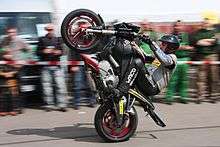
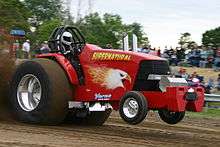
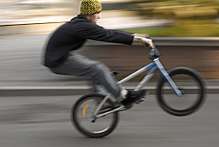
History
The first wheelie was done in 1890 by trick bicyclist Daniel J. Canary, shortly after modern bicycles became popular.[3][4] Wheelies appear in popular culture as early as 1943, as U.S Army motorized cavalry are pictured in Life magazine performing high speed wheelies.[5] Daredevil Evel Knievel performed motorcycle acrobatics including wheelies in his shows. Doug "The Wheelie King" Domokos has accomplished such feats as a 145-mile (233 km) wheelie.[6]
Types
Types of wheelie can be divided into two broad categories:
- 1. wheelies in which the vehicle power is sufficient by itself, as described in the Physics section below. These include:
- Clutch wheelies: performed by revving the engine with the clutch disengaged, and then abruptly engaging (a.k.a. 'dumping') the clutch.
- Power wheelies or roll-on wheelies: performed by simply opening the throttle. If the engine has sufficient power, it will be able to lift the front wheel.
- 2. wheelies performed with the aid of suspension dynamics or rider motion. These include:
- Bounce wheelies or slap wheelies: performed by opening and closing the throttle in time with suspension rebounding, tire rebounding, rider motion, or any combination of the three.
- Manuals: performed without applying torque to the rear wheel at all, but instead by moving the rider's body backwards relative to the bike, and then pulling back on the handlebars near the end of available travel.
Bicycles
Wheelies are a common stunt in artistic cycling and freestyle BMX. The bike is balanced by the rider's weight and sometimes use of the rear brake. A style of bicycle, the wheelie bike, has a seating position, and thus center of mass, nearly over the rear wheel that facilitates performing wheelies.
Motorcycle
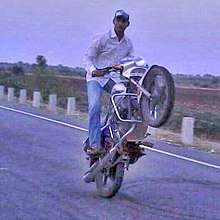
A wheelie is also a common motorcycle stunt. The principles is the same as the bicycle wheelie, but the throttle and rear brakes are used to control the wheelie while a rider uses body weight and the steering to control the direction the inertia of the spinning front wheel acting as a balance.[7]
The world's fastest motorcycle wheelie record is 307.86 km/h (191.30 mph) by Patrik Furstenhoff. April 18, 1999.[8] The world record for the fast wheelie over 1 km (0.6 mi) is 343.388 km/h (213.371 mph),[9] set by Egbert van Popta at Elvington airfield in Yorkshire, England.[10]
In some countries, such as the United Kingdom and USA,[11] motorcyclists performing a wheelie on a public road may be prosecuted for dangerous driving,[12][13] an offense which can carry a large fine and a ban of a year or more.[14]
In Pakistan, India, and some other countries, it is illegal to perform these kinds of stunts. If someone is caught performing these acts, the rider can have their motorcycle impounded and potentially face jail time.[15]
Automobiles
Wheelies are common in auto- or motorcycle drag racing, where they represent torque wasted lifting the front end, rather than moving the vehicle forward. They also usually result in raising the center of mass, which limits the maximum acceleration. In the absence of wheelie bars, this effect is quantified in the physics section below. If wheelie bars are present then a wheelie results in a reduction of load on the rear driving wheels, along with a corresponding reduction in friction.
Snowmobiles
Wheelies are possible with some snowmobiles, whereby it is the skis that are lifted off the ground.
Wheelchairs
Some wheelchair users can learn to balance their chair on its rear wheels and do a wheelie. This enables them to climb and descend curbs and maneuver over small obstacles.[16] Occasionally wheelchair dancers perform wheelies.
Aircraft
In an airplane, a wheelie is performed by conducting a soft-field landing or take-off procedure. The pilot increases the elevator backpressure so the nose wheel of the landing gear has minimal contact with the ground.
On 14 February 2020, the Guinness World Record for the longest-distance wheelie in an airplane was set in a Cessna 172 at Southern California Logistics Airport in Victorville, California on its runway 17. The pilot kept the plane's nose wheelie from touching the asphalt surface for a distance of 14,319 feet.[17][18][19]
Wheelie bars
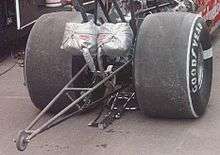
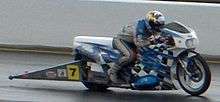
Wheelie bars help prevent a vehicle's front end from raising too high or flipping over. Wheelie bars are required for some tractor and truck pull events.[20][21] Wham-O developed and sold an add-on wheelie bar for wheelie bikes.
Dougie's Wheelie
On September 25, 2016, British trials motorcyclist Dougie Lampkin successfully wheelied around the Isle of Man TT course.[22] He completed the challenge in one hour and 35 minutes, after the attempt was postponed 24 hours because of strong winds.
Physics
A wheelie is imminent when the acceleration is sufficient to reduce the load borne by the front axle to zero.[23] The conditions for this can be calculated with the so-called "weight transfer equation":
where is the change in load borne by the front wheels, is the longitudinal acceleration, is the center of mass height, is the wheelbase, and is the total vehicle mass.[24][25]
An equivalent expression, which does not require knowing the load borne by the front wheels nor the total vehicle mass, is for the minimum longitudinal acceleration required for a wheelie:
where is the acceleration due to gravity, is the horizontal distance from the rear axle to the center of mass, and is the vertical distance from the ground to the center of mass.[26] Thus the minimum acceleration required is directly proportional to how far forward the center of mass is located and inversely proportional to how high it is located.
Since mechanical power can be defined as force times velocity, in one dimension, and force is equivalent to mass times acceleration, then the minimum power required for a wheelie can be expressed as the product of mass, velocity, and the minimum acceleration required for a wheelie:
Thus the minimum power required is directly proportional to the mass of the vehicle and to its velocity. The slower a vehicle is moving, the less power is required to perform a wheelie, and that is without even considering the power required to overcome air drag, which increases with the cube of velocity. Therefore, the least amount of power required is when the vehicle begins accelerating from rest.
In the case of tractor and truck pulling, the force to the pull the load is applied above the ground, and so it also acts to lift the front wheels and thus reduces the forward acceleration necessary to lift the front wheels.
The total power required during a wheel, neglecting air drag can be shown to be:
where is vehicle with mass, is the vehicle radius of gyration, and are distance from rear wheel contact patch to center of mass, is horizontal acceleration, is horizontal velocity, is angle of vehicle from horizontal, is angular velocity of vehicle rotation, and is angular acceleration of vehicle rotation. This can be separated into components necessary only for horizontal acceleration
and components necessary only for raising and rotating the vehicle
A factor M can be calculated as the ratio of the power required to raise and rotate the vehicle and the power required only for horizontal acceleration.[27]
Gallery
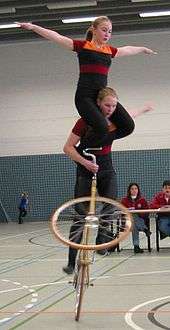 A wheelie as part of an artistic cycling routine
A wheelie as part of an artistic cycling routine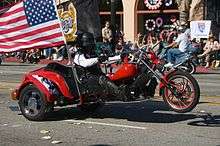 Tricycle performing a wheelie
Tricycle performing a wheelie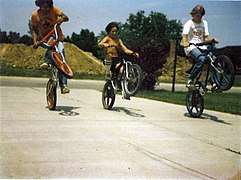 Wheelies by seated and standing cyclists
Wheelies by seated and standing cyclists Motor scooter performing a wheelie
Motor scooter performing a wheelie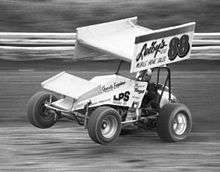 Sprint car performing a wheelie
Sprint car performing a wheelie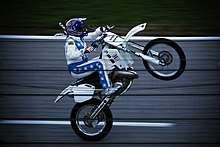 Robbie Knievel performing a wheelie
Robbie Knievel performing a wheelie Tractor performing a wheelie
Tractor performing a wheelie- Snowmobile performing a wheelie
Notes
- John Pearley Huffman (June 2010). "The Physics of Wheelstands". Car and Driver. Retrieved 2013-07-08.
- Investigation of the influences of tyre–road friction and engine power on motorcycle racing performance by means of the optimal manoeuvre method. Proceedings of the Institution of Mechanical Engineers, Part D: Journal of Automobile Engineering. Professional Engineering Publishing. Volume 224, Number 4 / 2010
- "Wizards Of The Wheel.: Genesis Of Trick Riding And Its Leading Exponents. D. J. Canary Originator of Fancy Riding in Chicago. First Rides the Ordinary with the Rear Wheel Raised. A. J. Nicolet and His Success in Difficult Performances. Makes a Tour of Mexico with Other Riders—Expert Lee Richardson. Tries the Pedal Mount. Adopts the Safety. Nicolet Rides a Unicycle. Lee Richardson's Tricks.", Chicago Daily Tribune (1872–1922), p. 39, May 31, 1896 – via ProQuest
- "Trick and Fancy Riders. Two Experts Who Excel with Difficult Feats on the Wheel. Maltby and Canary Both Claim the Championship", New York World, p. 19, December 6, 1891 – via NewspaperArchive.com
- Seate, Mike (February 2009). "History Of Stunting – The Streets". Super Streetbike magazine. ISSN 1934-4996.
- American Motorcyclist Association, "Doug Domokos", AMA Motorcycle Hall of Fame, retrieved 2009-12-17
- Motorcycle Design and Technology Handbook (Motorbooks Workshop) by Gaetano Cocco (Paperback—August 1, 2004)
- Young, Mark C.; Footman, Tim (2001), Guinness World Records 2001 –, Bantam Books, p. 226, ISBN 0-553-58375-1
- "Wheelie record". www.redbull.com. 2 September 2016. Retrieved 25 September 2016.
- "Wheelie title". Red Bull. 2 September 2016. Retrieved 25 January 2016.
- Weir, Richard (5 May 2008). "Spins the wheelie after flipping off cops". NY Daily News. Retrieved 25 January 2010.
- Vinter, Phil (14 May 2007). "Biker did wheelie at 61mph". Oxford Mail. Retrieved 20 December 2009.
- "Biker with one leg did a wheelie". Swindon Advertiser. 20 November 2004. Retrieved 20 December 2009.
- "Wheelie Bad". White Dalton. Retrieved 20 December 2009.
- "368 motorcyclists fined over wheelies". Visordown. 6 May 2008. Retrieved 25 January 2010.
- Kirby RL, Smith C, Seaman R, Macleod DA, Parker K. (2006). "The manual wheelchair wheelie: a review of our current understanding of an important motor skill". Disabil Rehabil Assist Technol. 1: 119–27. PMID 19256175.CS1 maint: multiple names: authors list (link)
- "Longest airplane wheelie (distance)". Guinness World Records. Retrieved 26 February 2020.
- Tulis, David. "CFI sets longest-distance aircraft 'wheelie'". AOPA. Retrieved 26 February 2020.
- Martinez, Arlene. "Pilot wheelies his way into the Guinness Book of World Records". USA Today. Retrieved 26 February 2020.
- "NATPA General Pulling Rules". National Antique Tractor Pullers Association. Retrieved 2013-12-29.
Wheelie bars are required in Divisions II, IIT, III, IV & V
- "5200 LB 2WD Modified 472 Cubic Inch Max Naturally Aspirated". Southern Pullers Association. Retrieved 2013-12-29.
All 2wd trucks are required to have wheelie bars on them
- "Dougie Lampkin successfully wheelies Isle of Man". Red Bull. Retrieved 2019-09-25.
- Cossalter, Vittore (2006). Motorcycle Dynamics (Second ed.). Lulu.com. p. 94. ISBN 978-1-4303-0861-4.
- John Pearley Huffman (June 2010). "The Physics of Wheelstands". Car and Driver. Retrieved 2013-07-13.
- P. Gritt (2002-08-20). "Introduction to Brake Systems" (PDF). DaimlerChrysler. Retrieved 2013-07-13.
- Gray, Constanzo, and Plesha (2010). Engineering Mechanics: Dynamics (1st ed.). McGraw-Hill. pp. 545–548.CS1 maint: multiple names: authors list (link)
- Gursagar Singh, Manjot Kaur (29 October 2018). "Power Translations for Deterrence or Stimulation of Wheelie/Wheel-stand for a Straight Moving Vehicle" (PDF). MATEC Web Conf. Volume 221, 2018. Retrieved 2018-11-15.
External links
| Wikimedia Commons has media related to Wheelies. |
| Look up wheelie in Wiktionary, the free dictionary. |
